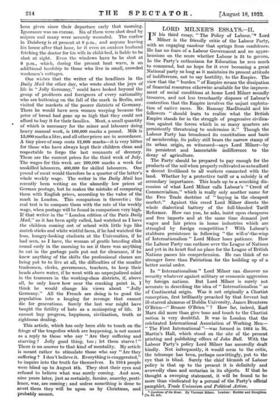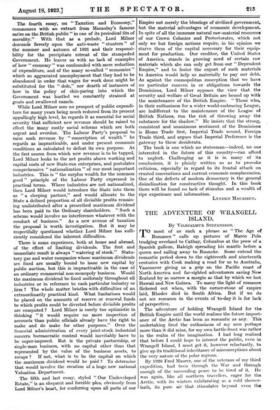LORD MILNER'S ESSAYS.—II.
IN his third essay, " The Policy of Labour,"* Lord Milner is the friendly critic of the Labour Party, with an engaging candour that springs from confidence. He has no fears of a Labour Government and no apprehensions on the score whether Labour is fit to govern. In the Party's enthusiasm for Education he sees much to commend, but no hope for it ever becoming a great National party so long as it maintains its present attitude of indifference, not to say hostility, to the Empire. The view that the " burden " of Empire means the dissipation of financial resources otherwise available for the improvement of social conditions at home Lord Milner soundly trounces, and not less trenchantly disposes of Labour's contention that the Empire involves the unjust exploita tion of native races. Mr. Ramsay MacDonald and his followers " should learn to realize what the British Empire stands for in the struggle of progressive civiliza tion against the forces which in so many quarters are persistently threatening to undermine it." Though the Labour Party has broadened its constitution and basis of membership, its policy still bears the narrow stamp of its urban origin, as witnessed—says Lord Milner—by its persistent and lamentable indifference to the decay of agriculture.
The Party should be prepared to pay enough for the products of the soil when properly cultivated so asto afford a decent livelihood to all workers connected with the land. Whether by a protective tariff or a subsidy is of secondary importance. This leads up to a searching dis cussion of what Lord Milner calls Labour's " Creed of Commercialism," which is really only another name for the Free Trade doctrine of " buying in the cheapest market." Against this creed Lord Milner directs the whole dialectical battery of the full-blooded Tariff Reformer. How can you, he asks, insist upon cheapness and free imports and at the same time demand just wages and fair prices in home industries which are strangled by foreign competition ? With Labour's stubborn persistence in following "the will-o'-the-wisp of Internationalism " Lord Milner loses patience. How the Labour Party can enthuse over the League of Nations and yet in its heart find no place for the League of British Nations passes his comprehension. He can think of no stronger force than Patriotism for the building up of a better social order.
In " Internationalism " Lord Milner can discover no security whatever against military or economic aggression by foreign nations. But Lord Milner is surely not accurate in describing the idea of " Internationalism " as of Continental origin. Was it not originally a Chartist conception, first brilliantly preached by that fervent but ill-starred alumnus of Dublin University, James Bronterre O'Brien—" Bronze O'Brien " ? How far, indeed, Karl Marx did more than give tone and touch to the Chartist notion is very doubtful. It was in London that the celebrated International Association of Working Men" The First International "—was formed in 1864 in St. Martin's Hall, which stood on the site of the present printing and publishing offices of John Bull. With the Labour Party's policy Lord Milner has assuredly dealt kindly. Not infrequently, it would seem to the critic, the telescope has been, perhaps unwittingly, put to the eye that is blind. Surely the chief blemish of Labour policy is that up to the present it is definitely and avowedly class and sectarian in its objects. If that be thought a sweeping statement, it will be found to be more than vindicated by a perusal of the Party's official pamphlet, Trade Unionism and Political Action. The fourth essay, on " Taxation and Economy," commences with an extract from Macaulay's famous satire on the. British public " in one of its periodical fits of morality." With that as a prelude, Lord Milner descends fiercely upon the anti-waste " stunters " of the summer and autumn of 1921 and their responsi bility for the precipitate retreat of the stampeded Government. He leaves us with no lack of examples of how " economy " was confounded with mere reduction of expenditure, and of the many so-called " economies " which so aggravated unemployment that they had to be abandoned in order that wages for work done might be substituted for the " dole," nor dearth of instances of how in the policy of skin-paring into which the Government was hustled we constantly strained at gnats and swallowed camels.
While Lord Milner sees no prospect of public expenditure for many years being much reduced from its present appallingly high level, he regards it as essential for social security that sufficient new revenue should be raised to effect the many costly social reforms which are both urgent and overdue. The Labour Party's proposal to raise such revenue by " conscription of wealth " he regards as impracticable, and under present economic conditions as calculated to defeat its own purpose. As the first source from which new revenue is to be tapped, Lord Milner looks to the net profits above working and capital costs of new State-run enterprises, and postulates comprehensive " nationalization " of our most important industries. This is " the surplus wealth for the common good " principle of the Labour Party expressed in practical terms. Where industries are not nationalized, then Lord Milner would introduce the State into them as " a sleeping partner," and would allocate to the State a defined proportion of all divisible profits remain ing undistributed after a prescribed maximum dividend has been paid to the Ordinary shareholders. " Such a scheme would involve no interference whatever with the conduct of business." As a new avenue of taxation the proposal is worth investigation. But it may be respectfully questioned whether Lord Milner has sufficiently considered the inherent difficulties.
There is some experience, both at home and abroad, of the effect of limiting dividends. The first and immediate result is always " watering of stock." Statutory gas and water companies whose maximum dividends are fixed are usually bound to issue new capital by public auction, but this is impracticable in the case of an ordinary commercial non-monopoly business. Would the maximum dividend be fixed uniformly throughout all industries or in reference to each particular industry or firm ? The whole matter bristles with difficulties of an extraordinarily practical kind. What limitations would be placed on the amounts of reserve or renewal funds to which profits could be diverted before divisible profits are computed ? Lord Milner is surely too optimistic in thinking " it would require no more inspection of accounts than public officials already have the right to make and do make for other purposes." Over the financial administration of every joint-stock industrial eoncern bureaucratic control would inevitably have to be super-imposed. But is the private partnership, or single-man business, with no capital other than that represented by the value of the business assets, to escape ? If not, what is to be the capital on which the maximum dividend would be paid ? To determine that would involve the creation of a huge new national Valuation Department.
The fifth and last essay, styled " Our Undeveloped Estate," is an eloquent and forcible plea, obviously from Lord Milner's heart, for conferring upon all parts of our Empire not merely the blessings of civilized government, but the material advantages of economic development. In spite of all the immense natural raw-material resources of our Crown Colonies and Protectorates, which not only we but foreign nations require, in his opinion we starve them of the capital necessary for their equipment for production. Our creditor, the United States of America, stands in growing need of certain raw materials which she can only get from our " Dependent Empire," and to foster the export of such materials to America would help us materially to pay our debt. As against the cosmopolitan conception that we have no particular concern in or obligations towards the Dominions, Lord Milner opposes the view that the security and welfare of Great Britain are bound up with the maintenance of the British Empire. " Those who, in their enthusiasm for a wider world-embracing League, are indifferent to the maintenance of the League of British Nations, run the risk of throwing away the substance for the shadow." He insists that the strong, consistent and unanimous sentiment of the Dominions is Home Trade first, Imperial Trade second, Foreign Trade third, and argues that Imperial Preference is the gateway to these desiderata.
The book is one which no statesman—indeed, no one interested in the future of this country—can afford to neglect. Challenging as it is in many of its conclusions, it is plainly written so as to provoke criticism, especially in regard to its frontal attack on crusted conventions and current economic complacencies. One of the defects of modern democracy is the general disinclination for constructive thought. In this book there will be found no lack of stimulus and a wealth of ripe experience and information.
LYNDEN MACASSEY.



































 Previous page
Previous page